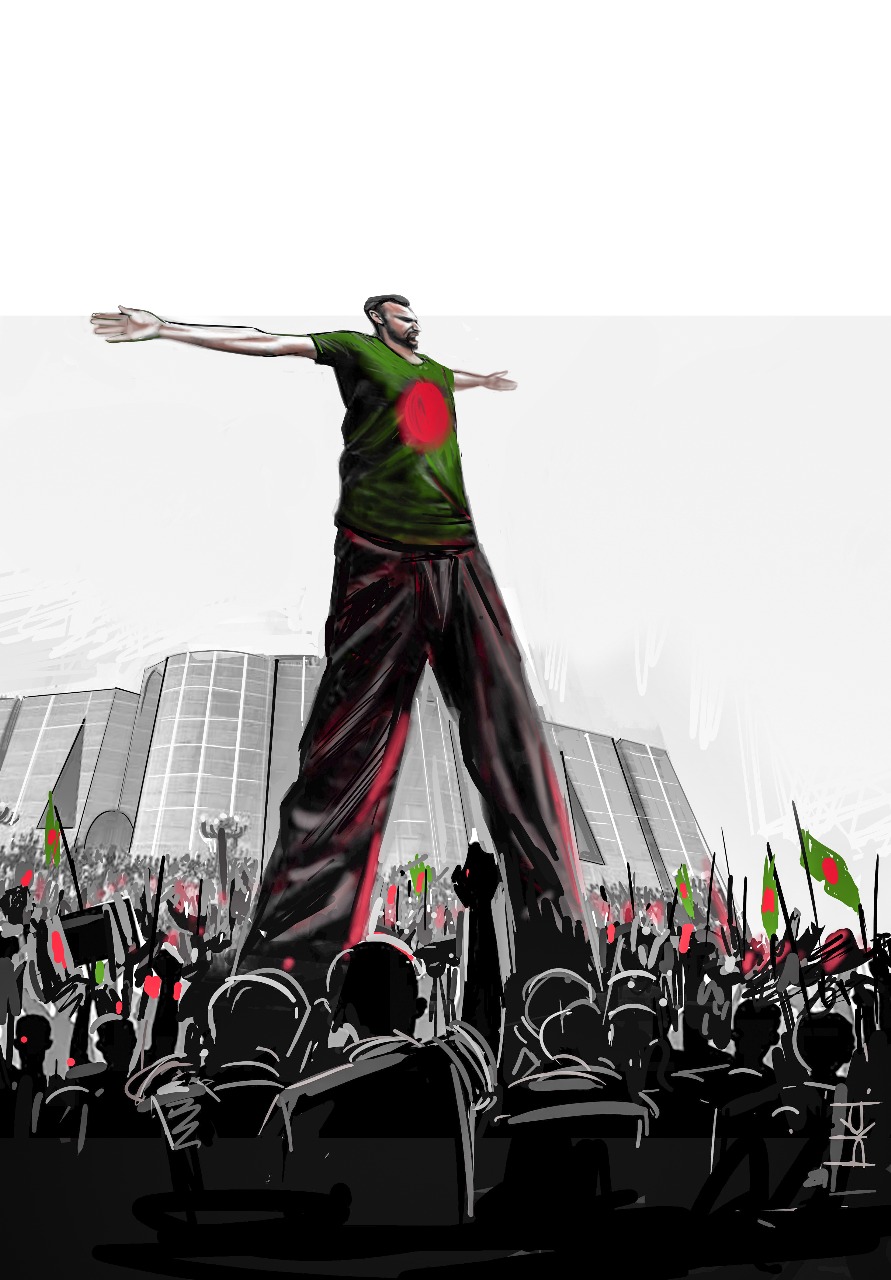Imagine the final moment of the unarmed Abu Sayed with his arms outstretched on his Rokeya University campus before his martyrdom at the hands of the disgruntled policemen on the fateful 16th of July in 2024.
When the 24-year-old English department student was gunned down by police during a peaceful protest, few could have predicted how profoundly his death would reshape the political landscape of Bangladesh.
Political analysts think that the political scenario started changing soon after the police opened fire on unarmed Abu Sayed on the Rokeya University campus.
Sayed was shot dead during a tripartite clash between police, Bangladesh Chhatra League (now a banned student wing of Awami League) and protesters of the Anti-discrimination Student Movement.
Five other people were also killed across the country during the countrywide demonstration, demanding the reform in quota-system in government jobs.
The incident ignited fuel against the administration of Sheikh Hasina who tried to stop the movement by brute force.
Political analyst and a Dhaka University teacher Abdullah-Al-Mamun told Times of Bangladesh that the death of Abu Sayed was a new shock to politics.
“It not only expedited the fall of the Sheikh Hasina government, but also marked a turning point. Over the past 15 years, leaders and activists of the main opposition party, BNP, have been subjected to torture and enforced disappearances. At one point, the movement was no longer limited to the quota issue as it evolved into a struggle against fascism.”
“Sayed stood boldly against various forms of discrimination, including a lack of fair recruitment in jobs. He believed that if one didn’t stand boldly, such injustices would continue indefinitely,” added Mamun.
Prof Abdul Latif Masum said Sayed’s death marked a watershed moment when the quota-reform movement morphed into the July uprising, which ultimately led to the fall of the Hasina regime.
“It was undoubtedly a courageous act. He showed the kind of bravery and mindset it takes to stand tall and take a bullet to the chest. That moment ignited like a spark and spread across the entire country,” he told Times of Bangladesh.
Before his martyrdom, Sayed was vocal and demonstrative within the Anti-discrimination Student Movement, part of a broader youth-led push for equity in public-sector recruitment and education reform. But it was his defiant final act—standing with raised arms, unarmed, in front of armed police—that turned him into a symbol.
The video of his killing went viral within hours, triggering protests in Dhaka, Chattogram, Khulna, and even in the diaspora.
For many, his death evoked memories of historic martyrs like Noor Hossain and Shamsuzzoha. But this was different—it was digital, immediate, and deeply personal for a new generation raised on activism and social media.
The aftermath saw extraordinary political and institutional consequences. Over 30 individuals, including senior police and university officials, were named in formal murder investigations.
The International Crimes Tribunal accepted evidence and began proceedings unprecedented in scope for a student killing.
The UN Human Rights Office declared it an “extrajudicial execution,” placing Bangladesh’s internal affairs on international watchlists.
The video of Sayed’s brutal killing sparked outrage across the country and encouraged the people from all walks of life to take to the streets, turning the anti-quota movement into a mass uprising against the Awami League government.
Besides, five more people, including two students, were killed in Dhaka and Chattogram and several hundred sustained injuries on the same day as the police and BCL activists jointly launched a heavy crackdown on the protesters across the country.
Two youths were killed during clashes in Dhaka College and Science Lab areas between the BCL men and protesters.
They were identified as Md Shajahan, a 24-year-old hawker who had a makeshift shop outside Balaka Cinema Hall, and the 25-year-old Sabuj Ali, son of Badsha Ali and Surja Banu of Nilphamari Sadar.
Besides, three people, including two students, were killed in clashes between protesters and BCL goons in Chattogram.
The deceased were identified as Wasim Akram, a student of Chittagong College and a Chhatra Dal leader, Faisal Ahmed, a management student at Omargani MES College, and Faruk, an employee of a furniture shop.


